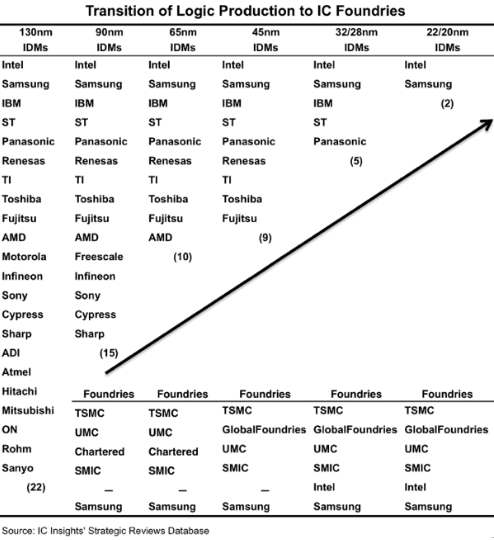Major IDMs Increasingly Rely on Foundries for Logic Production
Fab-lite business model strengthens; IDMs aim to keep capex at or below 10% of annual sales.
August 28, 2014 -- Arguably, no other trend has so quickly swept through the IC industry and stirred up so much debate about the future of chip making as the spread of fab-lite (or asset-lite) business model, which is being embraced by a growing number of major IDMs worldwide. Most recently, large Japanese IC makers—namely Toshiba, Renesas, Sony, and Fujitsu—joined the fab-/asset-lite movement after several years in which U.S. and European IDMs started reining in capital expenditures on expensive new 300mm wafer fabs and increased their use of third-party foundries. Nearly all IDMs today (excluding giant Intel and the memory makers) are now aiming to keep capital spending at or below 10% of annual sales compared to the IC industry’s average of 20% in the last decade.
The advent of fab-/asset-lite strategies has led to a rash of predictions that many IDMs are on their way to becoming fabless because they have stopped investing in leading-edge wafer plants and development of next-generation digital CMOS technologies. Indeed, some IDMs have used fab-/asset-lite strategies as steppingstones to going fabless—such as LSI and Integrated Device Technology (IDT)—but many other IC manufacturers insist “lite” business models are sustainable over the long term since they’ve narrowed their strategic product focus to categories that do not require 300mm wafer processes or expensive fabs.
According to IC Insights’ recently released Mid-Year Update to the 2014 McClean Report, the number of IDMs producing leading-edge logic devices has declined from 22 at the 130nm technology node to only two at the 22/20nm technology node (Figure 1). The four major pure-play foundries—TSMC, GlobalFoundries, UMC, and SMIC—will continue to be the leading benefactors of new business that transitions away from the IDMs.
With an increasing number of large semiconductor companies (e.g., ST, NXP, Infineon, Renesas, Sony, Fujitsu, Toshiba, etc.) stating their intentions to rely more on outside foundries for their IC production, it is easy to see why IC Insights forecasts foundries will impact an increasing amount of worldwide IC sales over the next several years.

Figure 1
Report Details: The Mid-Year Update to the 2014 McClean Report
Further details on foundry trends within the IC industry are provided in IC Insights’ Mid-Year Update to its 2014 McClean Report—A Complete Analysis and Forecast of the Integrated Circuit Industry. The Mid Year Update provides extensive IC Insights forecasts for the IC industry for the rest of 2014 and through 2018, including fresh looks at regional and global GDP growth, semiconductor capital spending trends, updates to R&D spending by company, challenges with 3D manufacturing, and updates on the prospect of the industry moving to 450mm wafers. The 250-page Mid-Year Update features more than 200 charts and graphs that give a thorough overview, analysis, and forecast of IC industry trends.
The Mid-Year Update is one of several monthly updates that are provided free with a paid annual subscription to The McClean Report. However, new for 2014, IC Insights is offering the Mid-Year Update for sale as a single-purchase report priced at $1,990.
Related Semiconductor IP
- Multi-channel Ultra Ethernet TSS Transform Engine
- Configurable CPU tailored precisely to your needs
- Ultra high-performance low-power ADC
- HiFi iQ DSP
- CXL 4 Verification IP
Related News
- Sequans Expands Business Model with Technology IP Licensing and Engineering Services
- Fab-Lite/Asset-Lite Business Model Gaining Momentum
- Infineon affirms move to 'fab-lite' strategy
- ST increases outsourcing, denies fab-lite strategy
Latest News
- SEALSQ and Lattice Collaborate to Deliver Unified TPM-FPGA Architecture for Post-Quantum Security
- SEMIFIVE Partners with Niobium to Develop FHE Accelerator, Driving U.S. Market Expansion
- TASKING Delivers Advanced Worst-Case Timing Coupling Analysis and Mitigation for Multicore Designs
- Efficient Computer Raises $60 Million to Advance Energy-Efficient General-Purpose Processors for AI
- QuickLogic Announces $13 Million Contract Award for its Strategic Radiation Hardened Program